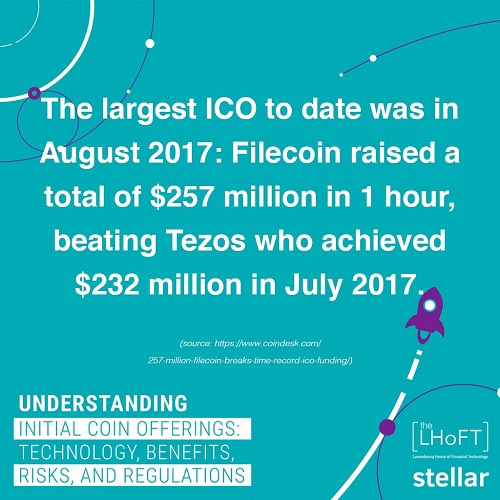
The Luxembourg House of Financial Technology Foundation (LHoFT) and the Stellar Development Foundation have collaborated to release a white paper that explores and explains the boom in Initial Coin Offerings (ICOs).
The LHoFT and the Stellar Development Foundation spent two months speaking with developers, regulators, lawyers and entrepreneurs to gather information and diverse perspectives for the paper. The paper will shed light on the benefits and risks of ICOs, the ICO lifecycle, potential regulatory measures, policy considerations, and recent global regulatory developments.
Since January 2017, organizations have raised over $1.8 billion through ICOs. By June, blockchain entrepreneurs had raised more money through ICOs than traditional venture capital investments in the year. The growing momentum in ICOs is driving industry leaders and policymakers to better understand ICO economics, technology, and regulatory landscape.
ICOs have the potential to be a powerful catalyst fueling the development of open-source blockchain technologies. ICOs could also prove to be a significant driver for financial access and inclusion by democratizing access to investments. The ICO model enables a fast and efficient fundraising mechanism in which token distribution helps to generate a built-in user base for the organization’s product or service.
However, ICOs may involve a variety of risks ranging from consumer protection to money laundering. There are currently insufficient due diligence efforts to evaluate the validity of all organizations conducting ICOs. Furthermore, token valuations may be irrational and not based upon the tokens’ fundamental value. Moreover, the prices of tokens are highly volatile and could be manipulated in multiple ways, including pumping and dumping, spoofing, and front-running.
In the past two months, regulators have begun to issue statements on the legality of ICOs. Industry players have begun to undertake self-regulatory initiatives. Organizations that were planning to launch an ICO are now rethinking their strategy to be compliant with best practices and regulatory requirements.
Despite regulatory uncertainty, the technology community sees strong potential in blockchain technologies, and there is strong demand for useful and legitimate tokens. The ultimate objective for regulators is to structure flexible requirements that reduce risks while accommodating innovation in this young but burgeoning industry.
Lindsay Lin, Regulatory Counsel & Program Manager at Stellar commented: “The fundamental technologies underlying the ICO explosion — that is, distributed ledgers, smart contracts, consensus algorithms, and cryptography — have tremendous potential to transform network applications and usage, data integrity and security, authentication and identification, and trustless settlements. These technologies are here to stay. The key task for regulators is to create policies that reduce consumer and money laundering risks without impeding the adoption and development of these promising technologies. While many organizations that conduct ICOs may fail within the next few years, the ones that remain will drive a new era of innovative and inclusive internet-level networks."
Emilie Allaert, Head of Operations and Projects at the Luxembourg House of Financial Technology Foundation, added “in continuation of the European regulatory surge to strengthen investor protections, Europe must demonstrate that government and industry cooperation that values technological innovation can lead to a favourable framework for businesses as well as for investors.”








